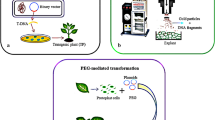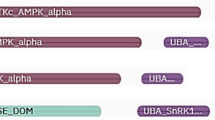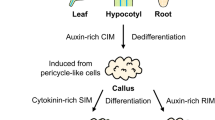Abstract
For perennial woody plants, it is important to establish an efficient transformation method to facilitate gene functional studies and protein subcellular localization assays. Therefore, calluses are ideal materials for these purposes. Here, we optimized a series of over-expression vectors with different fluorescent protein tags and antibiotic selections, providing the possibility to generate transgenic callus expressing two different fusion proteins at the same time. On the other hand, a series of RNAi (RNA interference) vectors were also modified by introducing free eGFP or mCherry as reporters to facilitate visual screening. With the help of these improvements, stable transgenic lines expressing an autophagosome marker, GFP-FhATG8a (Autophagy 8a) were generated, and further studies showed that autophagosomes were more abundant during NaCl treatment or phosphate deficiency. By knocking down the expression of a key autophagy gene, FhATG5, the resulting callus was more susceptible to salt, indicating that autophagy is essential for stress response in citrus. In summary, our study provided an effective system for callus-base transformation to study gene function, and this new approach was successfully used to study the activity of autophagy in citrus as an example.
Key message
We optimized the over-expression and RNAi vectors for citrus callus transformation and established an effective strategy for gene functional studies and protein subcellular localization assays in citrus.







Similar content being viewed by others
Data availability
All materials and data generated in the current study are available from the corresponding author on reasonable request.
Abbreviations
- AS:
-
Acetosyringone
- ATG:
-
Autophagy
- CRISPR:
-
Clustered regularly interspaced short palindromic repeats
- eGFP:
-
Enhance green fluorescent protein
- EV:
-
Empty vector
- mCherry:
-
Monomeric cherry
- MCS:
-
Multiple cloning site
- MT:
-
Murashge-tucker medium
- PCR:
-
Polymerase chain reaction
- qRT-PCR:
-
Real-time quantitative PCR
- RNAi:
-
RNA interference
References
Cinelli RA, Ferrari A, Pellegrini V et al (2000) The enhanced green fluorescent protein as a tool for the analysis of protein dynamics and localization: local fluorescence study at the single-molecule level. Photochem Photobiol 71(6):771–776. https://doi.org/10.1562/0031-8655(2000)071%3c0771:tegfpa%3e2.0.co;2
Duan YX, Guo WW, Meng HJ et al (2007) High efficient transgenic plant regeneration from embryogenic calluses of citrus sinensis. Biol Plant 51(2):212–216. https://doi.org/10.1007/s10535-007-0043-7
Gao C, Luo M, Zhao Q et al (2014) A unique plant ESCRT component, FREE1, regulates multivesicular body protein sorting and plant growth. Curr Biol 24(21):2556–2563. https://doi.org/10.1016/j.cub.2014.09.014
Gong JL, Tian Z, Qu XL et al (2021a) Illuminating the cells: the transient transformation of citrus to study gene functions and organelle activities related to fruit quality. Hortic Res 8(1):175. https://doi.org/10.1038/s41438-021-00611-1
Gong JL, Zeng YL, Meng QN et al (2021b) Red light-induced kumquat fruit coloration is attributable to increased carotenoid metabolism regulated by FcrNAC22. J Exp Bot 72(18):6274–6290. https://doi.org/10.1093/jxb/erab283
Hu Q, Min L, Yang X et al (2018) Laccase GhLac1 modulates broad-spectrum biotic stress tolerance via manipulating phenylpropanoid pathway and jasmonic acid synthesis. Plant Physiol 176(2):1808–1823
Hung YH, Slotkin RK (2021) The initiation of RNA interference (RNAi) in plants. Curr Opin Plant Biol 61:102014. https://doi.org/10.1016/j.pbi.2021.102014
Huo L, Guo Z, Zhang Z et al (2020) The apple autophagy-related gene MdATG9 confers tolerance to low nitrogen in transgenic apple callus. Front Plant Sci 11:423. https://doi.org/10.3389/fpls.2020.00423
Kirisako T, Ichimura Y, Okada H et al (2000) The reversible modification regulates the membrane-binding state of Apg8/Aut7 essential for autophagy and the cytoplasm to vacuole targeting pathway. J Cell Biol 151(2):263–276. https://doi.org/10.1083/jcb.151.2.263
Kurusu T, Koyano T, Hanamata S et al (2014) OsATG7 is required for autophagy-dependent lipid metabolism in rice postmeiotic anther development. Autophagy 10(5):878–888. https://doi.org/10.4161/auto.28279
Levy A, El-Mochtar C, Wang C et al (2018) A new toolset for protein expression and subcellular localization studies in citrus and its application to citrus tristeza virus proteins. Plant Methods 14:2. https://doi.org/10.1186/s13007-017-0270-7
Li DL, Tan B, Duan YX et al (2009) Regeneration of transgenic citrus plants__from the trimmed shoot_root region of etiolated seedlings. Biol Plant 53(3):578–582. https://doi.org/10.1007/s10535-009-0105-0
Long JM, Liu CY, Feng MQ et al (2018) Corrigendum: miR156-SPL modules regulate induction of somatic embryogenesis in citrus callus. J Exp Bot 69(16):4141. https://doi.org/10.1093/jxb/ery197
Luo L, Zhang P, Zhu R et al (2017) Autophagy is rapidly induced by salt stress and is required for salt tolerance in Arabidopsis. Front Plant Sci 8:1459. https://doi.org/10.3389/fpls.2017.01459
Nelson BK, Cai X, Nebenführ A (2007) A multicolored set of in vivo organelle markers for co-localization studies in Arabidopsis and other plants. Plant J 51(6):1126–1136. https://doi.org/10.1111/j.1365-313X.2007.03212.x
Pérez-Pérez ME, Lemaire SD, Crespo JL (2021) The ATG4 protease integrates redox and stress signals to regulate autophagy. J Exp Bot 72(9):3340–3351. https://doi.org/10.1093/jxb/erab063
Ransom EM, Ellermeier CD, Weiss DS (2015) Use of mCherry red fluorescent protein for studies of protein localization and gene expression in clostridium difficile. Appl Environ Microbiol 81(5):1652–1660. https://doi.org/10.1128/aem.03446-14
Reumann S (2004) Specification of the peroxisome targeting signals type 1 and type 2 of plant peroxisomes by bioinformatics analyses. Plant Physiol 135(2):783–800. https://doi.org/10.1104/pp.103.035584
Singh S, Rajam MV (2010) Highly efficient and rapid plant regeneration in citrus sinensis. J Plant Biochem Biotechnol 19(2):195–202. https://doi.org/10.1007/BF03263340
Sparkes IA, Runions J, Kearns A et al (2006) Rapid, transient expression of fluorescent fusion proteins in tobacco plants and generation of stably transformed plants. Nat Protoc 1(4):2019–2025. https://doi.org/10.1038/nprot.2006.286
Sun J, Movahed N, Zheng H (2020) LUNAPARK Is an E3 ligase that Mediates degradation of ROOT HAIR DEFECTIVE3 to maintain a tubular ER network in Arabidopsis. Plant Cell 32(9):2964–2978. https://doi.org/10.1105/tpc.18.00937
Tang T, Yu X, Yang H et al (2018) Development and validation of an effective CRISPR/Cas9 vector for efficiently isolating positive transformants and transgene-free mutants in a wide range of plant species. Front Plant Sci 9:1533. https://doi.org/10.3389/fpls.2018.01533
Tian GW, Mohanty A, Chary SN et al (2004) High-throughput fluorescent tagging of full-length Arabidopsis gene products in planta. Plant Physiol 135(1):25–38. https://doi.org/10.1104/pp.104.040139
Wang P, Richardson C, Hawes C et al (2016) Arabidopsis NAP1 regulates the formation of autophagosomes. Curr Biol 26(15):2060–2069. https://doi.org/10.1016/j.cub.2016.06.008
Wang P, Sun X, Jia X et al (2017) Apple autophagy-related protein MdATG3s afford tolerance to multiple abiotic stresses. Plant Sci 256:53–64. https://doi.org/10.1016/j.plantsci.2016.12.003
Wang P, Pleskot R, Zang J et al (2019) Plant AtEH/Pan1 proteins drive autophagosome formation at ER-PM contact sites with actin and endocytic machinery. Nat Commun 10(1):5132. https://doi.org/10.1038/s41467-019-12782-6
Wang P, Gao E, Hussey PJ (2020) Autophagosome biogenesis in plants: an actin cytoskeleton perspective. Trends Plant Sci 25(9):850–858. https://doi.org/10.1016/j.tplants.2020.03.011
Wang K, Gao EL, Liu D et al (2021) The ER network, peroxisomes and actin cytoskeleton exhibit dramatic alterations during somatic embryogenesis of cultured citrus cells. Plant Cell Tissue Organ Cult 148(2):259–270. https://doi.org/10.1007/s11240-021-02180-6
Wang S, Li LX, Zhang Z et al (2022) Ethylene precisely regulates anthocyanin synthesis in apple via a module comprising MdEIL1, MdMYB1, and MdMYB17. Hortic Res. https://doi.org/10.1093/hr/uhac034
Wielopolska A, Townley H, Moore I et al (2005) A high-throughput inducible RNAi vector for plants. Plant Biotechnol J 3(6):583–590. https://doi.org/10.1111/j.1467-7652.2005.00149.x
Zhang F, LeBlanc C, Irish VF et al (2017) Rapid and efficient CRISPR/Cas9 gene editing in Citrus using the YAO promoter. Plant Cell Rep 36(12):1883–1887. https://doi.org/10.1007/s00299-017-2202-4
Zhang B, Yang HJ, Qu D et al (2022) The MdBBX22-miR858-MdMYB9/11/12 module regulates proanthocyanidin biosynthesis in apple peel. Plant Biotechnol J. https://doi.org/10.1111/pbi.13839
Zheng X, Wu M, Li X et al (2019) Actin filaments are dispensable for bulk autophagy in plants. Autophagy 15(12):2126–2141. https://doi.org/10.1080/15548627.2019.1596496
Zhu CQ, Zheng XJ, Huang Y et al (2019) Genome sequencing and CRISPR/Cas9 gene editing of an early flowering mini-citrus (Fortunella hindsii). Plant Biotechnol J 17(11):2199–2210. https://doi.org/10.1111/pbi.13132
Zhuang XH, Chung KP, Luo MQ et al (2018) Autophagosome biogenesis and the endoplasmic reticulum: a plant perspective. Trends Plant Sci 23(8):677–692. https://doi.org/10.1016/j.tplants.2018.05.002
Acknowledgements
This work was supported by the National Key Research and Development Program (2019YFD1000103), NSFC grants (no.31772281, 91854102), Foundation of Hubei Hongshan Laboratory (2021hszd016) to P.W. We thank Saiyu Cao, Kun Wang (Huazhong Agricultural University) for their help in this work.
Funding
National Key Research and Development Program,2019YFD1000103,Pengwei Wang,National Natural Science Foundation of China,31772281,Pengwei Wang,91854102,Pengwei Wang
Author information
Authors and Affiliations
Contributions
PW: designed and supervised the project, EG: performed experiments and wrote the manuscript, YZ: helped experiments and tissue culture; WG: provided citrus materials and gave valuable suggestions throughout the study.
Corresponding author
Ethics declarations
Conflict of interest
The authors have not disclosed any competing interests.
Additional information
Communicated by Goetz Hensel.
Publisher's Note
Springer Nature remains neutral with regard to jurisdictional claims in published maps and institutional affiliations.
Supplementary Information
Below is the link to the electronic supplementary material.
Rights and permissions
Springer Nature or its licensor (e.g. a society or other partner) holds exclusive rights to this article under a publishing agreement with the author(s) or other rightsholder(s); author self-archiving of the accepted manuscript version of this article is solely governed by the terms of such publishing agreement and applicable law.
About this article
Cite this article
Gao, E., Zhao, Y., Guo, W. et al. Optimized plasmids for callus transformation and functional studies of autophagy in citrus. Plant Cell Tiss Organ Cult 152, 507–516 (2023). https://doi.org/10.1007/s11240-022-02423-0
Received:
Accepted:
Published:
Issue Date:
DOI: https://doi.org/10.1007/s11240-022-02423-0




